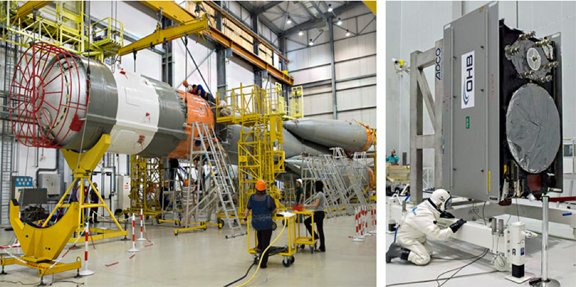 [SatNews] Preparations for Arianespace's next Soyuz flight are in full swing at multiple locations across the Spaceport, including a key integration step for the medium-lift launcher, plus the start-up of fueling for its Galileo satellite passengers.
[SatNews] Preparations for Arianespace's next Soyuz flight are in full swing at multiple locations across the Spaceport, including a key integration step for the medium-lift launcher, plus the start-up of fueling for its Galileo satellite passengers.Soyuz' Block I third stage was mated to the vehicle's core during activity today in the MIK Launcher Integration Building, concluding its basic build-up. Once the checkout process is completed, Soyuz will be transferred to the launch pad, where it will receive the two Galileo spacecraft and the Fregat upper stage, all of which are well into preparation phases of their own.

Some of Arianespace Flight VS11’s parallel preparations are highlighted in the photos above. At left, Soyuz’ Block I third stage is mated to the launcher at the Spaceport’s MIK integration building; while the fourth Galileo Full Operational Capability (FOC) satellite – FM4 – is loaded with on-board propellant inside the S5A fueling and integration hall (at right).
Photos are courtesy of Arianespace.
Payload fueling commenced earlier this week, with Flight Model #4 (FM4)—the fourth Galileo Full Operational Capability (FOC) satellite—receiving its propellant load in the Spaceport's S5A fueling and integration hall. After its "sister" FM3 co-passenger undergoes this same process, the two will be integrated side-by-side on a dispenser for their shared ride aboard Soyuz on March 27. The fueling process followed the finalization last week of FM3 and FM4's hardware and software, as well as the charging of their batteries, which will be relied upon during the short period from launch to unfurling of these spacecraft's solar arrays in orbit.
The Galileo program is Europe's initiative for satellite navigation, providing a highly accurate global positioning system under civilian control, to consist of 30 satellites in total, along with European control centers and a worldwide network of sensor and uplink stations. Galileo's FOC phase, during which the network's complete operational and ground infrastructure will be deployed, is managed and funded by the European Commission, with the European Space Agency delegated as the design and procurement agent on the Commission's behalf.
The FM3 and FM4 spacecraft were built by OHB System in Bremen, Germany. Their navigation payloads, which will generate the precision positioning measurements and services to users worldwide, were supplied by Surrey Satellite Technology Ltd. in Guildford, UK.
This upcoming mission is designated Flight VS11 in Arianespace's numbering system. It will be the company's fourth launch carrying spacecraft for the Galileo constellation, as well as the 11th flight of a workhorse Soyuz from French Guiana since the 2011 introduction.

